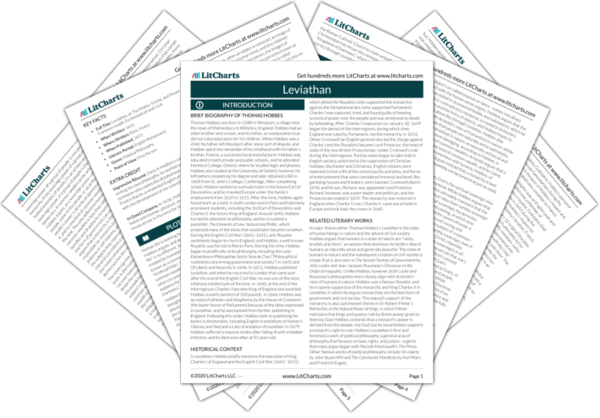War Quotes in Leviathan
Chapter 3 Quotes
For the Thought of the warre, introduced the Thought of delivering up the King to his Enemies; The Thought of that, brought in the Thought of the delivering up of Christ; and that again the Thought of 30 pence, which was the price of that treason: and thence easily followed that malicious question; and all this in a moment of time; for Thought is quick.
Chapter 11 Quotes
And therefore the voluntary actions, and inclinations of all men, tend, not only to the procuring, but also to the assuring of a contented life; and differ onely in the way: which ariseth partly from the diversity of passions, in divers men; and partly from the difference of the knowledge, or opinion each one has of the causes, which produce the effect desired.
Chapter 13 Quotes
Hereby it is manifest, that during the time men live without a common Power to keep them all in awe, they are in that condition which is called Warre; and such a warre, as is of every man, against every man. For Warre, consisteth not in Battel lonely, or the act of fighting; but in a tract of time, wherein the Will to contend by Battell is sufficiently known: […] All other time is peace.
Whatsoever therefore is consequent to a time of Warre, where every man is Enemy to every man; the same is consequent to the time, wherein men live without other security, than what their own strength, and their own invention shall furnish from withal. In such a condition, there is no place for industry; because the fruit thereof is uncertain: and consequently no Culture of the Earth; […] no Knowledge of the face of the Earth; no account of Time; no Arts; no Letters; no Society; and which is worst of all, continuall feare, and danger of violent death; And the life of man, solitary, poore, nasty, brutish, and short.
The Passions that encline men to Peace, are Feare of Death; Desire of such things as are necessary to commodious living; and a Hope by their Industry to obtain them. And Reason suggesteth convenient Articles of Peace, upon which men may be drawn to agreement. These Articles, are they, which otherwise are called the Lawes of Nature: whereof I shall speak of more particularly, in the two following chapters.
Chapter 19 Quotes
Now a Monarchy, the private interest is the same with the publique. The riches, power, and honour of a Monarch arise onely from the riches, strength and reputation of his Subjects. For no King can be rich, nor glorious, nor secure; whose Subjects are either poore, or contemptible, or too weak through want, or dissention, to maintain a war against their enemies; Whereas in a Democracy, or Aristocracy, the publique prosperity conferres not so much to the private fortune of one that is corrupt, or ambitious, as doth many times a perfidious advice, a treacherous action, or a Civill warre.












